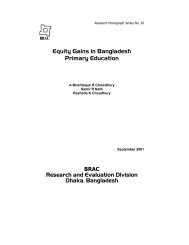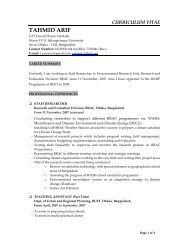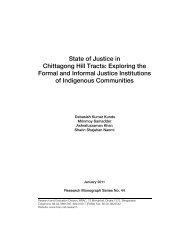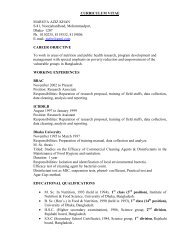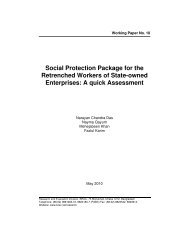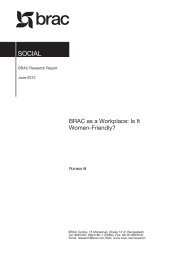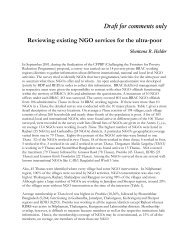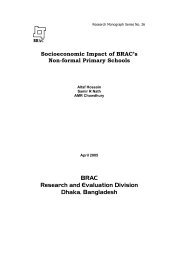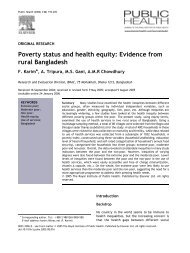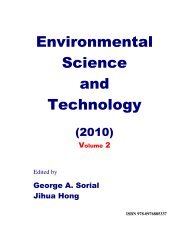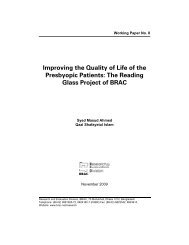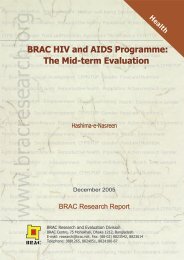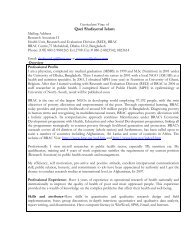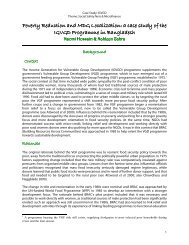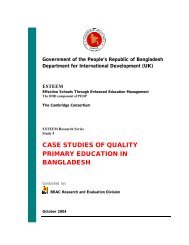Combining health and social protection measures to reach the ultra ...
Combining health and social protection measures to reach the ultra ...
Combining health and social protection measures to reach the ultra ...
Create successful ePaper yourself
Turn your PDF publications into a flip-book with our unique Google optimized e-Paper software.
Decision-making<br />
systems development. Partnerships are urgently needed<br />
between government policy bodies <strong>and</strong> academic/research<br />
organizations experienced in this area.<br />
Re-defining <strong>the</strong> starting point<br />
It is time perhaps <strong>to</strong> change <strong>the</strong> starting point, i.e. public<br />
policy-makers must be placed at centre stage <strong>and</strong> researchers<br />
should aim <strong>to</strong> serve <strong>the</strong>ir needs. In addition, citizens <strong>and</strong> civil<br />
society have a vital – <strong>and</strong> so far neglected – role <strong>to</strong> play in<br />
setting research priorities 14 <strong>and</strong> having an influence on policy<br />
formulation. There is an important role of <strong>the</strong> citizen or<br />
community in evidence-based policy, for example, in <strong>the</strong><br />
increasing community engagement <strong>and</strong> citizen participation<br />
in <strong>health</strong> systems <strong>and</strong> <strong>the</strong> increasing trend <strong>to</strong>wards including<br />
patient <strong>and</strong> public input in<strong>to</strong> research. Research-funders <strong>and</strong><br />
policy-makers have <strong>to</strong> become a lot more skilled at ensuring<br />
that researchers spend a lot of <strong>the</strong>ir time researching <strong>the</strong><br />
questions that have <strong>the</strong> greatest potential <strong>to</strong> improve society.<br />
They should be encouraged <strong>to</strong> fund syn<strong>the</strong>sis research <strong>and</strong><br />
impact assessments in support of policy decisions. The trick<br />
here is <strong>to</strong> connect science with policy, <strong>and</strong> policy with<br />
science. It is desirable <strong>to</strong> have both “evidence-based policy”<br />
<strong>and</strong> “policy-based evidence” 15 . In o<strong>the</strong>r words, policies should<br />
be based on evidence, <strong>and</strong> once policies have been<br />
formulated, <strong>the</strong>re should be evidence on how <strong>to</strong> achieve <strong>the</strong><br />
set goals, <strong>and</strong> <strong>to</strong> develop, implement <strong>and</strong> evaluate needed<br />
strategies. There is no better way than <strong>to</strong> have policy-makers<br />
intimately engaged in <strong>the</strong> science. However, one must be<br />
careful <strong>to</strong> make sure that “evidence-based policy-making”<br />
does not become “policy-based evidence-making”, i.e.<br />
creating <strong>and</strong> selecting evidence that suits <strong>and</strong> justifies certain<br />
formulated policies. Sometimes policy-makers want <strong>to</strong> stretch<br />
<strong>the</strong> interpretation of research findings <strong>to</strong> reinforce <strong>the</strong><br />
“validity” of <strong>the</strong> policies <strong>the</strong>y are already decided upon. There<br />
are potential problems when researchers get <strong>to</strong>o close <strong>to</strong><br />
policy, e.g. concerns about loss of objectivity <strong>and</strong> freedom <strong>to</strong><br />
criticize government policy, <strong>and</strong> how <strong>to</strong> guard against this.<br />
Policy-making is complex<br />
It should be acknowledged that it is <strong>to</strong>o simplistic <strong>to</strong> think that<br />
policy-making could ever be based solely on scientific<br />
evidence. In addition <strong>to</strong> scientific evidence, policies are also<br />
based on values, emotions, “know-how”, intuition, “gut<br />
feeling” <strong>and</strong> <strong>the</strong> wishes of interest groups, for example. The<br />
reality of how decisions are made dictates that scientific<br />
evidence is only one consideration among several. Such<br />
evidence can even in its best form be only background. In<br />
some cases, it is perfectly possible for wise policy-makers <strong>to</strong><br />
develop good policies without research. In o<strong>the</strong>r cases,<br />
policy-makers listen more <strong>to</strong> <strong>the</strong> voters than <strong>to</strong> <strong>the</strong><br />
researchers. We should perhaps admit this <strong>and</strong> not set<br />
unrealistic expectations for <strong>the</strong> role of scientific evidence, <strong>and</strong><br />
acknowledge that, on <strong>the</strong> o<strong>the</strong>r h<strong>and</strong>, failing <strong>to</strong> grab<br />
accessible evidence may delay intervention opportunities. For<br />
example, it <strong>to</strong>ok 263 years after <strong>the</strong> discovery of <strong>the</strong><br />
preventive value of citrus juice against scurvy before sailors’<br />
shipboard diets were routinely supplemented with it at <strong>the</strong><br />
end of <strong>the</strong> 19th century. The link of smoking <strong>to</strong> lung cancer<br />
was found in 1950 but it was not until 1957 that any<br />
legislative action was initiated. How long will it take <strong>to</strong> tackle<br />
<strong>the</strong> current epidemic of obesity if our will <strong>to</strong> intervene awaits<br />
<strong>the</strong> delivery of perfect evidence that proposed solutions will<br />
work? Thus, <strong>the</strong> balance between action <strong>and</strong> fur<strong>the</strong>r research<br />
is an interesting <strong>and</strong> important one. When do we need policy<br />
decisions <strong>and</strong> when do we need more research? ❏<br />
Tikki Pang has been Direc<strong>to</strong>r of <strong>the</strong> Department of Research<br />
Policy & Cooperation, World Health Organization, Geneva,<br />
Switzerl<strong>and</strong> since August 1999. He has previously held positions<br />
as Lecturer <strong>the</strong>n Associate Professor at <strong>the</strong> Department of Medical<br />
Microbiology, Faculty of Medicine, <strong>and</strong> <strong>the</strong>n as Professor of<br />
Biomedical Sciences, Institute of Postgraduate Studies &<br />
Research, University of Malaya, Kuala Lumpur, Malaysia.<br />
Dr Tikki Pang is currently Chairman of <strong>the</strong> Working Group on<br />
Typhoid Fever, International Vaccine Institute, Seoul, Korea;<br />
Secretary, WHO Research Ethics Review Committee; Secretary,<br />
WHO Advisory Committee on Health Research; member of <strong>the</strong><br />
edi<strong>to</strong>rial board of six international journals. Previously held<br />
positions include Clinical Specialist (Medical Microbiology),<br />
University Hospital, Kuala Lumpur, Malaysia; Member, National<br />
Biotechnology Committee, Ministry of Science, Malaysia<br />
(Coordina<strong>to</strong>r for Molecular Biology & Genetic Engineering); Edi<strong>to</strong>rin-Chief<br />
& Publisher, Asia Pacific Journal of Molecular Biology &<br />
Biotechnology.<br />
158 ✜ Global Forum Update on Research for Health Volume 4



